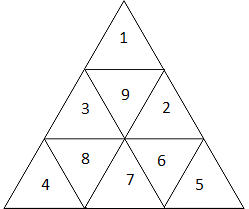Magic triangular square
An triangular square is an equilateral triangle of side length filled with rows of unit equilateral triangles. There are unit equilateral triangles, hence the name.
If we fill a triangular square with all the integers from to such that the sum of the numbers in each sub-triangular square is the same, what is the maximum value that this sum can take?
 This triangular square is not magical because the sums of every 2 x 2 triangular square are all different (15, 22 and 20).
This triangular square is not magical because the sums of every 2 x 2 triangular square are all different (15, 22 and 20).
The answer is 23.
This section requires Javascript.
You are seeing this because something didn't load right. We suggest you, (a) try
refreshing the page, (b) enabling javascript if it is disabled on your browser and,
finally, (c)
loading the
non-javascript version of this page
. We're sorry about the hassle.
Let S be the value of the maximum sum.
We have three 2 × 2 sub-triangular squares. Thus S = a + b + c + d = b + e + f + g = d + g + h + i .
Since a + b + c + d + e + f + g + h + i = 1 + 2 + 3 + 4 + 5 + 6 + 7 + 8 + 9 = 4 5 and a + b + c + d + e + f + g + h + i = 3 S − b − d − g , then
S = 3 4 5 + b + d + g = 1 5 + 3 b + d + g .
If we can choose b , d and g maximal, then b + d + g = 7 + 8 + 9 = 2 4 and S = 1 5 + 8 = 2 3 .
Here is such a configuration :